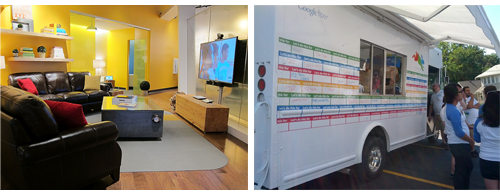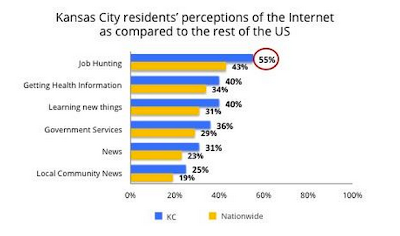It’s been five days since we kicked off the
Google Fiber Rally in Kansas City, Kansas and Kansas City, Missouri, and we’ve been blown away by the community’s reaction. So far, 40 fiberhoods have qualified for service, more than 2,000 people have visited our Fiber Space, we’ve talked to thousands of people via online and phone customer service, and we’ve distributed upwards of 2,000 ice cream sandwiches from our Fiber trucks.
Through our many conversations, we’ve noticed that some details about Google Fiber may still be a little unclear. So today we’re going to share and answer some of the top questions we’ve been getting about Google Fiber, so that we can keep everyone
up-to-date in Kansas City.
1. When are you building to North and South Kansas City, Mo.?
Our first pre-registration phase includes homes in Kansas City, Kan. and homes in Central Kansas City, Mo. But we are definitely committed to serving homes in North and South Kansas City, Mo. in our second pre-registration phase. Residents should stay tuned to google.com/fiber and this blog for more information.
2. I have a business and I can’t pre-register. Why?
We’re focused on making residential connections right now, but we’ll have an announcement about a small business offering soon.
3. How did Google determine fiberhood pre-registration goals?
Like many of our projects at Google, we relied on data. All fiberhoods are different. They range in size and density as well as speed and ease of Fiber construction. For example, houses that are spread out (like in the suburbs) require more time, fiber and labor, and therefore are more difficult to connect than homes in a dense urban environment. So, in those fiberhoods that are more complicated to build, we want to make sure that enough residents will want Fiber service. We don’t want Fiber to be out of reach for anyone—it’s our hope that the pre-registration goals will be practical and attainable.
4. Help! I’m in a fiberhood but I keep getting a pre-registration error.
There are two possible issues here that we're working hard to fix. Some addresses (mostly apartments) with unit numbers are causing errors during pre-registration. Also, the "submit address review" form doesn't always work. In either case, please
give us a call,
chat with us or
email us and we'll help you out.
5. What if I don’t have access to the Internet to learn about Fiber or pre-register?
We know that 25% of Kansas Citians don’t have access to broadband at home. So, to help spread the word about Google Fiber, we have a dedicated street team that visits fiberhoods throughout Kansas City, Kan. and Kansas City, Mo. Our teams pass out flyers (and ice cream!), answer questions about Google Fiber and help pre-register anyone who is interested. Look out for our Google Fiber trucks in a fiberhood near you. We also have a local building, or
Fiber Space, that Kansas Citians can visit. Google Fiber team members are there every day of the week to answer questions and help with pre-registration.
Google Fiber Space and a Google Fiber ice cream truck
6. Why is the construction fee for the Free Internet service so expensive? What do I do if I can’t afford it?
As a Google Fiber customer, you will have a gigabit-ready Fiber cable routed to, and built directly into, your home. Studies show that simply having this connection will add value to your home and will put you on the cutting edge of broadband technology. We’re charging $300 for this construction.
To make the construction fee more manageable, subscribers can break it into payments of $25 per month during the first year, and free for at least the next six years. Over time, this Free Internet service is very affordable—it works out to an average of $3.57 per month over seven years’ time.
7. Why do I have to pay $10 just to pre-register?
Your $10 pre-registration fee will be applied to your Google Fiber service. If your fiberhood qualifies for service, your $10 will go directly to either your first month of service fees (for our Gigabit +TV or Gigabit Internet plans), or to your $300 construction fee (for the Free Internet plan). If your fiberhood does not qualify for service, your $10 will be refunded.
8. How did you choose which public buildings you would connect for free in each fiberhood?
When we announced that we’d bring Google Fiber to Kansas City, Kan. and Kansas City, Mo. we also committed to building free, 1 Gigabit per second connections to the cities’ choice of public buildings. Both cities collaborated on a list of the public buildings that they wanted to connect, and then they gave the list to us. We will bring Fiber to these buildings that are located in qualified fiberhoods.
We’ll try and update this blog as we get more questions in. And in the meantime, if you have your own burning questions, there are a lot of resources you can turn to:
• Read our
online FAQ, which has a lot of common questions and answers.
• Follow Google Fiber on
Twitter to find out where our street teams will be visiting
•
Chat live with a Fiber team member online
•
Email Google Fiber support
•
Call Google Fiber support
•
Visit our Fiber Space and learn about Fiber in-person with our team members (RSVP if you want to avoid a long wait time)
We’re here to help, so get in touch!
Posted by Kevin Lo, General Manager, Google Access


